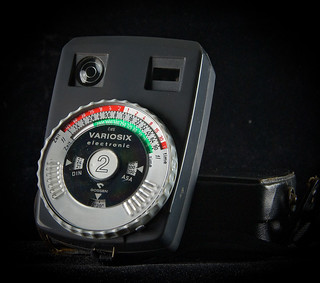Difference between revisions of "Gossen Variosix"
m (change photo to existing username) |
(added polysix photo) |
||
| Line 4: | Line 4: | ||
|image= http://farm4.staticflickr.com/3505/4059736964_8381f6c62f_n.jpg | |image= http://farm4.staticflickr.com/3505/4059736964_8381f6c62f_n.jpg | ||
|image_align= left | |image_align= left | ||
| − | |image_text= 1972 model | + | |image_text= Variosix 1972 model |
|image_by= Anssi Puisto | |image_by= Anssi Puisto | ||
|image_rights= (C) | |image_rights= (C) | ||
}}{{br}} | }}{{br}} | ||
| + | {{Flickr_image | ||
| + | |image_source= http://www.flickr.com/photos/nikjeeeh/7116746585/in/pool-camerawiki/ | ||
| + | |image= http://farm9.staticflickr.com/8008/7116746585_21b7659057_m.jpg | ||
| + | |image_align= right | ||
| + | |image_text= Polysix | ||
| + | |image_by= n.l.j. | ||
| + | |image_rights= wp | ||
| + | }} | ||
| + | |||
The 1968 [[Gossen]] '''Variosix Electronic''', also called '''Polysix''', (in US '''Multibeam Electronic''') exposure meter combined a conventional hand held meter with built in selective metering. For reflected readings the meter provides three angles of measurement: 10°, 20°, and 30°. | The 1968 [[Gossen]] '''Variosix Electronic''', also called '''Polysix''', (in US '''Multibeam Electronic''') exposure meter combined a conventional hand held meter with built in selective metering. For reflected readings the meter provides three angles of measurement: 10°, 20°, and 30°. | ||
Revision as of 02:36, 23 June 2013

|
| Variosix 1972 model image by Anssi Puisto (Image rights) |

|
| Polysix image by n.l.j. (Image rights) |
The 1968 Gossen Variosix Electronic, also called Polysix, (in US Multibeam Electronic) exposure meter combined a conventional hand held meter with built in selective metering. For reflected readings the meter provides three angles of measurement: 10°, 20°, and 30°.
There are two apertures in the front face, one for the light cell and one for the built in viewfinder.
It is also a type of zero or null pointer measuring meter. It measures with CdS sensor.
Measurement
Two leds are on the front panel, for measurement the large computer dial is rotated until both have equal brightness. Exposure settings may then be read directly from the scale.